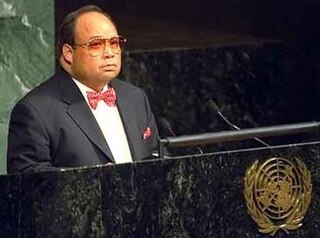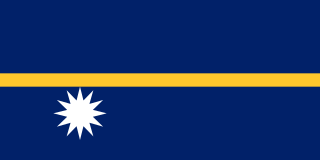
Politics of Nauru takes place in a framework of a parliamentary representative democratic republic, whereby the President of Nauru is the head of government of the executive branch. Legislative power is vested in both the government and the parliament. The Judiciary is independent of the executive and the legislature.
Ludwig Derangadage Scotty is a Nauruan politician who twice served as President of Nauru and has been Speaker of Parliament since 2013. He served as President from 29 May 2003 to 8 August 2003 and again from 22 June 2004 until his ousting in a vote of no confidence on 19 December 2007. He served as Speaker from 2000 until his election as President in 2003, again from November 2010 to April 2013, and from June 2013 to June 2016.

René Reynaldo Harris was President of the Republic of Nauru four times between 1999 and 2004. He was a Member of Parliament from 1977 to 2008.

David Waiau Adeang is a Nauruan politician, a former Speaker of the Parliament of Nauru, and Nauru's Minister for Finance and Justice, in addition he is the Minister Assisting the President of Nauru. He is a founding member of the Naoero Amo, currently the only successful political party on the island.

The Parliament of Nauru has 19 members, elected for a three-year term in multi-seat constituencies. The President of Nauru is elected by the members of the Parliament. The number of seats was increased to 19 following elections in 2013.
Michael Riddell Akua is a political figure from the Pacific nation of the Republic of Nauru.
Frederick William "Freddie" Pitcher is a Nauruan political figure. In December 2007, Pitcher was appointed Finance Minister of Nauru, to serve in the Administration of President Marcus Stephen.

Nationality and citizenship in the Republic of Nauru are currently defined and regulated by the Constitution of Nauru and the Nauruan Community Ordinance 1956-1962. Dual citizenship is permitted.

Parliamentary elections were held in Nauru on April 26, 2008, following the dissolving of Parliament by President Marcus Stephen on April 18. The decision came after what Stephen referred to as "months of political deadlock". Of the parliament's eighteen members, nine supported the Stephen government and nine were in opposition.
Roland Tullen Kun is a Nauruan politician and Member of Parliament.
Landon Deireragea is a Nauruan politician.

Parliamentary elections were held in Nauru on 24 April 2010, following the dissolution of parliament by President Marcus Stephen on 16 March 2010. The election was called due to repeated attempts to oust the government of Marcus Stephen in votes of no-confidence. There were 86 candidates, eight of them women. Nauru uses a modified Borda count electoral system in eight multi-member districts.

The 2003 Nauruan parliamentary election took place on 3 May 2003 in Nauru to elect members of the Parliament of Nauru. The election took place with Nauru having economic difficulties and a large budget deficit. This was the main issue in the election, which followed a period where a number of presidents had been elected for short periods of time. However the election resulted in deadlock for several weeks afterwards, with parliament divided between three candidates for president. It was only at the end of May that Ludwig Scotty was elected as the new president of Nauru and was able to form a new government.

Indirect presidential elections were held in Nauru on 1 November 2010 following the parliamentary elections held on 28 April 2010 and the repeated elections on 19 June 2010. The election was attempted to be held on 3 June 2010 and then on 4 June 2010, but failed both times. Another attempt was set for 6 July 2010 after incumbent president Marcus Stephen agreed to step aside to facilitate Aloysius Amwano's election as speaker. Rykers Solomon, an opposition MP, joined the government on 6 July 2010, but Amwano nonetheless refused to allow a motion to elect the president, suspending parliament until 8 July 2010. Amwano was subsequently dismissed by president Stephen and replaced by deputy speaker Landon Deireragea.









